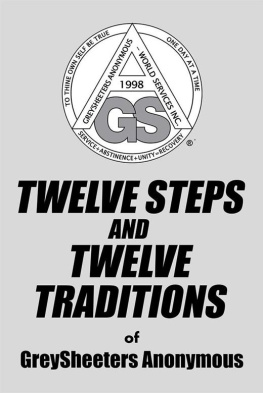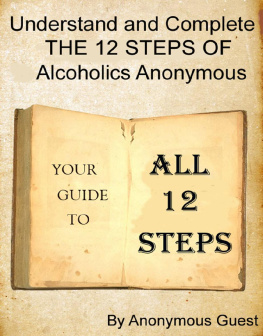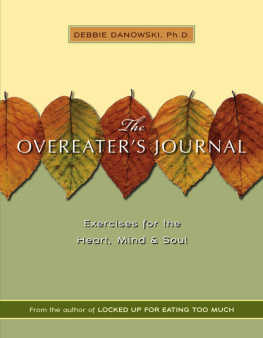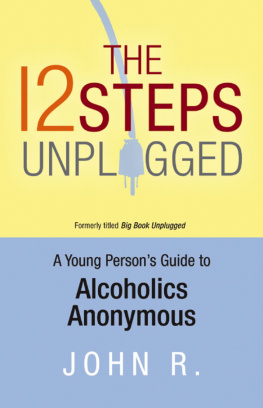
eISBN 978-1-889681-07-8
Library of Congress Catalog Card No.: 93-85052
Overeaters Anonymous, Inc.
World Service Office
6075 Zenith Court NE
Rio Rancho, New Mexico 87144-6424 USA
Mail address: P.O. Box 44020
Rio Rancho, NM 87174-4020 USA
1-505-891-2664
Web site: www.oa.org
19902012
by Overeaters Anonymous, Inc. All rights reserved.

PREAMBLE

Overeaters Anonymous is a Fellowship of individuals who, through shared experience, strength, and hope, are recovering from compulsive overeating. We welcome everyone who wants to stop eating compulsively. There are no dues or fees for members; we are self-supporting through our own contributions, neither soliciting nor accepting outside donations. OA is not affiliated with any public or private organization, political movement, ideology, or religious doctrine; we take no position on outside issues. Our primary purpose is to abstain from compulsive eating and to carry the message of recovery through the Twelve Steps of OA to those who still suffer.
CONTENTS

INTRODUCTION TO
THE TWELVE STEPS
INTRODUCTION TO
THE TWELVE TRADITIONS

INTRODUCTION TO
THE TWELVE STEPS
We of Overeaters Anonymous have found in this Fellowship a way to recover from the disease of compulsive overeating. After years of guilt over repeated failures to control our eating and our weight, we now have a solution that works. Our solution is a program of recoverya program of twelve simple steps. By following these steps, thousands of compulsive overeaters have stopped eating compulsively.
In OA we have no program of diets and exercise, no scales, no magic pills. What we do have to offer is far greater than any of these thingsa Fellowship in which we find and share the healing power of love. Our common bonds are two: the disease of compulsive eating from which we all have suffered, and the solution that we all are finding as we live by the principles embodied in these steps. Since our program is based on the twelve steps, we would like to offer here a study of those steps, sharing how we follow them to recover from compulsive eating. We hope in this way to provide help for those who still suffer from our disease. The second half of this book contains a study of the twelve traditions of Overeaters Anonymous, showing how our individual groups and OA as a whole solve problems and continue to carry the message of recovery to compulsive overeaters.
If you think you may be a compulsive overeater, give yourself a chance for recovery by trying the OA program. Our way of life, based on these twelve steps and twelve traditions, has brought us physical, emotional, and spiritual healing that we dont hesitate to call miraculous. What works for us will work for you, too.

We admitted we were
powerless over foodthat our lives
had become unmanageable.
In Overeaters Anonymous we begin our program of recovery by admitting that were powerless over food. Some of us have difficulty with this admission because weve had so much experience in trying to control our eating. At one time, or periodically, most of us were able to do so. Our eating may be out of control right now, we persisted in thinking, but someday soon well again muster the strength of character needed to check our eating excesses, and this time well keep them under control. For all of us, however, the days of controlled eating grew fewer and farther apart, until at last we came to OA, looking for a new solution.
In OA we learn that a lack of willpower isnt what makes us compulsive overeaters. In fact, compulsive overeaters often exhibit an exceptional amount of willpower. But compulsive eating is an illness that cannot be controlled by willpower. None of us decided to have this disorder, any more than we would have decided to have any other disease. We can now cease blaming ourselves or others for our compulsive eating.
The disease of compulsive eating is threefold in nature: physical, emotional, and spiritual. Compulsive eating does not stem simply from bad eating habits learned in childhood, nor just from adjustment problems, nor merely from a love of food, though all three of these may be factors in its development. It may be that many of us were born with a physical or emotional predisposition to eat compulsively. Whatever the cause, today we are not like normal people when it comes to eating.
Like compulsive overeaters, normal eaters will sometimes find pleasure and escape from lifes problems in excess food. Compulsive overeaters, however, often have an abnormal reaction when we overindulge. We cant quit. A normal eater gets full and loses interest in food. We compulsive overeaters crave more. Some of us even have a strange reaction to particular foods: while others can comfortably eat single portions of these foods, we feel compelled to eat another serving after weve finished the firstand then anotherand another. Not all compulsive overeaters can identify particular foods which give us this trouble, but many of us can. What all of us have in common is that our bodies and minds seem to send us signals about food which are quite different from those the normal eater receives. We have found through much experience that no matter how long we abstain from eating compulsively, and no matter how adept we become at facing lifes problems, we will always have these abnormal tendencies. Those of us who have returned to our former compulsive eating behaviors, even after years in recovery, have found it harder than ever to stop.
Clearly, if we are to live free of the bondage of compulsive eating, we must abstain from all foods and eating behaviors which cause us problems. If we dont ever overeat, we wont trigger the reaction that makes us crave more. But this, too, has proven impossible for us to do by our willpower alone. Before we found OA, every diet or period of control was followed by a period of uncontrolled eating. This is because our malady was not just physical in nature; it was emotional and spiritual as well. We were obsessed with food, and no amount of self-control or weight loss could cure us. Because of this obsession, the day always came when the excess food looked so inviting to us we couldnt resist, and our firm resolutions were forgotten. Sooner or later we always started overeating again and gradually (or rapidly) the eating worsened until at last we were out of control.
This mental obsession was something we couldnt be rid of by our unaided human will. Another power, stronger than ourselves, had to be found to relieve us of it, if we were to stop eating compulsively and stay stopped.
Most of us have tried to deny to ourselves that we have this disease. In OA we are encouraged to take a good look at our compulsive eating, obesity, and the self-destructive things we have done to avoid obesitythe dieting, starving, over-exercising, or purging. Once we honestly examine our histories, we can deny it no longer: our eating and our attitudes toward food are not normal; we have this disease.
Next page









